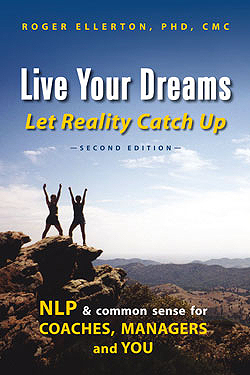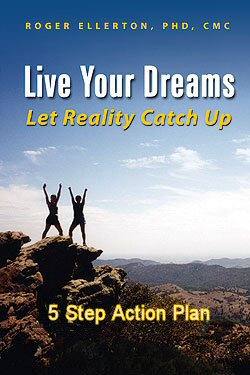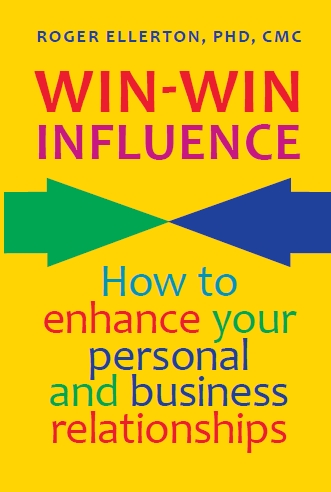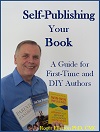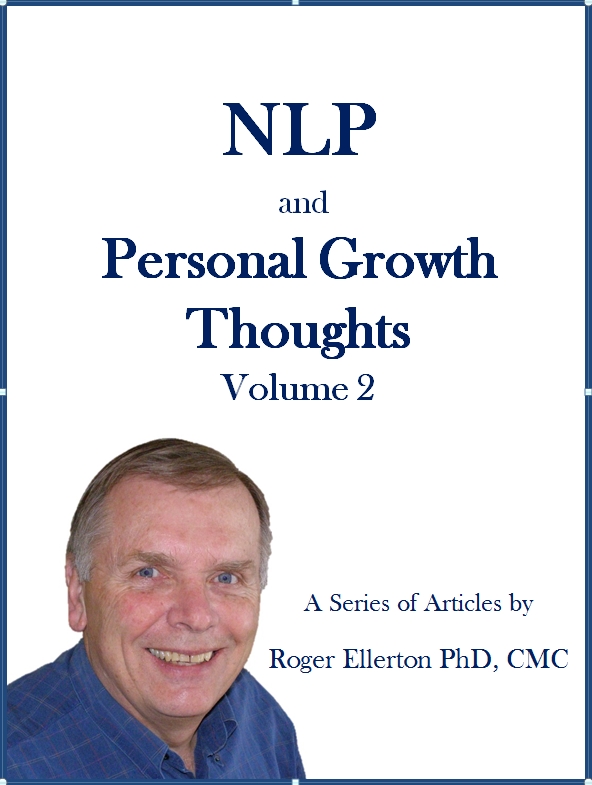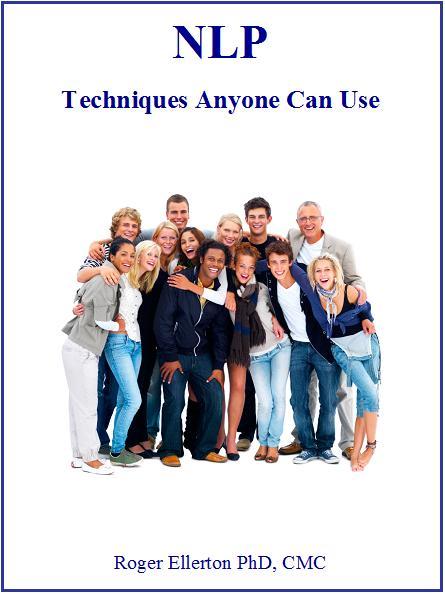The Structure of Reality
By Roger Ellerton Phd, ISP, CMC, Renewal Technologies Inc.
This article may not be republished without written permission from Roger Ellerton/Renewal Technologies Inc. If you republish this article without permission, you will be in violation of copyright law and sent an invoice. You may share this and other pages with your friends by linking directly to this page from your website or blog.
What is Reality? Why is it that some people see something as possible (within their reality) and others totally discount it?
Your Perception of the World is Your Reality
In previous articles (NLP Communication Model Part I and II), we discussed how we filter information based on our beliefs, values, memories, meta programs, etc. As a result of this filtering, we have a perception of the world that we call reality. There is a saying: "If you wish to change your life, first you must change the way you perceive your life."
To get a better understanding of reality and how it affects our lives, consider the following: Suppose the circle in Figure 1, represents all possible knowledge - all that has been discovered and all that will be discovered. One piece of this circle represents 'What you know you know' - you know your name, where you live, etc. Another piece of the circle represents 'What you know you don't know' - you know there is something called scuba diving, but you do not know any of the details or how to do it. These two pieces represent what you call reality (or your perception of reality). The rest of the circle is 'What you don't know you don't know' and is, at this time, outside of your perception (reality). Because it is not part of your awareness or reality, this does not mean that it does not have an effect on your life. For example, until I tell you, are you aware that you have a new stomach lining every five days (Ref: Deepak Chopra)?
Figure 1: Your Reality and Stepping Outside of It
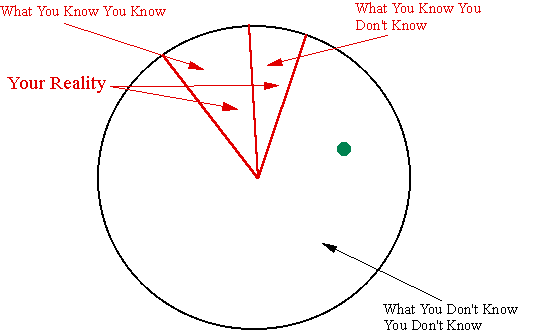
The Larger Your Reality, the More Choices You Have in Life
If you were to step out of your reality to, say, the green dot (i.e. do something you have never done before and do not have any idea how it will turn out), how might you feel? For example if you had never been to Japan, were not a world traveler, could not speak Japanese and found yourself instantaneously transported to a street corner in downtown Tokyo; how might you feel? Fearful, confused, apprehensive, anxious, ...? Or you may find your mind goes blank. (If part of your reality is to travel to different places and experience the culture with the local inhabitants, you may experience this quite differently). What is your typical reaction when you are fearful, confused, apprehensive, anxious, ...? Many people move back to something they know and perceive to be safe (their reality) and shut down any process of exploring new ideas about the world or about themselves. If you are to expand your reality and your potential in life, I believe it is necessary to explore 'what you don't know you don't know'.
A 'Green Dot' Moment
When students in our NLP trainings discover new things about themselves or explore their beliefs and values, sometimes they find themselves fearful, confused, apprehensive, anxious, ... . I point out to them that this is a good thing, as it means they are exploring new aspects of themselves - how can they be fearful, confused, apprehensive, anxious, ... about something they already know! As they become more comfortable exploring who they are and trusting in themselves, it is common to hear them say "I am having a green dot moment" or "Wow! I just had a green dot moment and learned something very valuable about myself or how I perceive the world."
The next time you feel fearful, confused, apprehensive, anxious, ...; first make sure you are safe, then breathing deep (often we tend to hold our breath at times like this, which only makes the situation feel worse) explore what this is all about. Just maybe you will discover new insights about who you are, your beliefs and values, your strategies for achieving what you want in life or how you can handle that everyday situation differently and achieve a different more desired result.
Appreciating Another Person's Reality
Assume that you and I grew up in different cultures with different religions, with different beliefs and values and for argument sake have totally different perceptions of the world. This is illustrated in the extreme in Figure 2. What is the potential for us to agree and work together? If we both hold fast to our beliefs, values, etc. and are not willing to explore new ideas (ever meet anyone like that?), then I am sure that we would be continuously disagreeing - and how much fun is that? On the other had, what would happen if you decided to explore my reality - you don't have to agree with me, only appreciate and respect that I can have different beliefs, values, etc. than you and avoid judging which of our beliefs/values is right or wrong. At first you may find my reality confusing (a 'green dot' moment), however, if you were to continue to explore my reality, then you have the potential to expand your reality (more choice in your life), assist me in being more tolerant of your reality and open up the possibility for us to improve our communication with each other. In being flexible in your approach (being able to explore ideas outside of your reality), you have the potential of creating much more for yourself and assist others at the same time. Is this not what is meant by organizational experts who say we should encourage diversity in the workplace?
Figure 2: Appreciating Different Realities
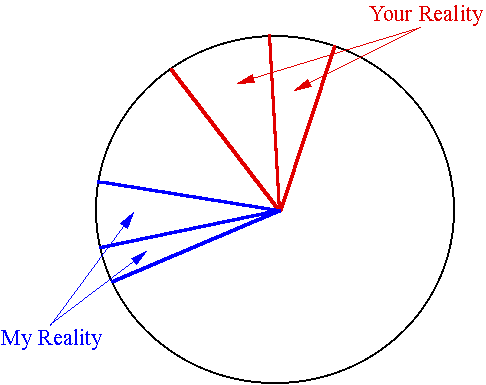
How would your life and the results you are achieving in your life be different, if you were to accept that members of your family, coworkers or neighbours see the world differently than you (have a different reality)? All you need to do is chose to be inquisitive and appreciate their different perspectives.
What You Don't Know You Know
Looking at Figure 1, you may realize there is another part to the circle 'What you don't know you know'. This can have many interpretations. For example: Memories that you have chosen not to remember, or children who are culturally conditioned to take on certain roles and not others (boys are to follow in the footsteps of their fathers or young girls are told they can not do mathematics or be engineers or airline pilots, ...). What impact does this have on your reality and choices in life?
Innovation is Exploring 'What you Don't Know You Don't Know'
Finally, let's talk briefly about innovation. This can be your own personal innovation, innovation in the workplace or within society. Referring to Figure 1, where will the innovative new ideas come from? From 'what we already know we know'? - No! From 'what we know we don't know'? - Some potential for small advances. Or from stepping into 'what we don't know we don't know' or 'what we don't know we know'? - Yes, this is where the opportunity lies for big breakthroughs!
NLP assists people to expand their reality in a safe and respectful way.
And NLP is Much more than that!
Reality leaves a lot to the imagination
John Lennon
Author: Roger Ellerton is a certified NLP trainer, certified management consultant and the founder and managing partner of Renewal Technologies. The above article is based on his book Live Your Dreams Let Reality Catch Up: NLP and Common Sense for Coaches, Managers and You.
Copyright © 2003, Renewal Technologies Inc. All rights reserved.


